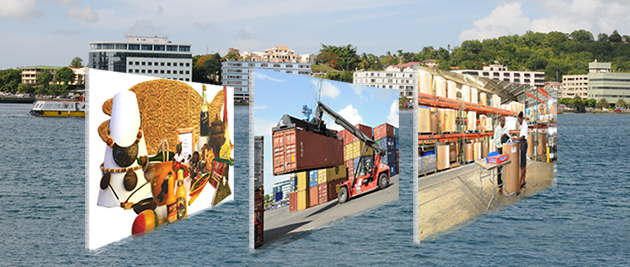
Ministry of Commerce, Manufacturing, Business Development, Cooperatives and Consumer Affairs
Warning (2): Creating default object from empty value [APP/controllers/departments_controller.php, line 23]

Caricom Single Market and Economy (CSME)
WHAT IS THE CARICOM SINGLE MARKET AND ECONOMY (CSME)?
It is s the creation of a single large market and economic space among 15 Caribbean nations as opposed to 15 separate and distinct markets and economies, each governed by their own rules and divided from each other by formidable barriers. It allows for free movement of CARICOM goods, services, people and capital throughout the Caribbean Community through the removal of the fiscal, legal, physical, technical and administrative barriers which have historically prevented such activities from taking place. It is a structure that ought to further harmonizes economic, monetary and fiscal policies and measures across all CARICOM Member States.
Why the CSME?
It will create greater economic and political strength from a grouping of 15 countries as apposed to each individual country. Small states will be better able to negotiate with regional groupings and superpowers as a group than individually. It creates more opportunities for employment, investment, production and trade for the inhabitants of the Caribbean Community. The closer and larger market created will help diversify the range of markets in which CARICOM goods and services will be traded and therefore reduce our dependence on our few traditional markets.
How is the CSME being Implemented?
By amending the Treaty which established the Caribbean Community. (The 1973 Treaty of Chaguaramas). This was done through the signing and ratification of nine protocols. By the modification of national laws, policies and programs of Member States to accommodate these and other decisions made at the Regional level. By active interest and participation of the Region's people in the CARICOM Single market and Economy.
What are the Key Components of the CARICOM Single Market and Economy?
1) Free Movement of Goods:
There has to be agreement on regional standards for the production of goods throughout the Community. This has led to the establishment of the Caribbean Regional Organization for Standards and Quality (CROSQ). Sanitary and Phytosanitary arrangements that are scientifically based.
A CET for goods originating outside of CARICOM;
Rules of origin that determine which goods should be traded within CARICOM without the application of tariffs and non-tariff barriers.
2) Free Movement of Services:
Removal of restrictions on trade in services; Common standards and regulations to govern cross-border movement of services and service providers; Access to information;
3) Free Movement of Persons:
Elimination of the need for passports by CARICOM nationals traveling within CARICOM; Facilitation of CARICOM nationals at immigration points within the region; Elimination of the need for work permits for skilled CARICOM nationals; Mechanisms for assessing equivalency of qualifications and for accreditation on a common basis; Harmonization and transferability of Social Security benefits across Member States.
4) Free Movement of Capital:
Monetary measures, Fiscal measures, Economic measures, Other supporting measures
5) The Caribbean Court of Justice (CCJ):
This will provide a solid judicial foundation for the success of the CSME as it will protect and enforce a range of rights. It will be the Court of Original Jurisdiction - the CCJ will be vested with the original jurisdiction in respect of the interpretation and application of the Revised CARICOM Treaty.
Appellate Jurisdiction:
The CCJ will function as the final court of appeal with respect to all civil and criminal matters from common law courts within the jurisdiction of CARICOM Member States. As an appellate court, the CCJ is expected to replace the Judicial Committee of the Privy Council.
What are the Benefits of the CSME?
Possibility for increased production and trade in goods and services in a combined market of over 14 million people; Production of competitive products of better quality and prices; Improved services provided by enterprises and individuals Creation of more opportunities for investment;
Creation of greater opportunity for travel;
Creation of more opportunities for nationals to study and work in CARICOM countries of their choice;
Creation of increased employment opportunities and improved standards of living;
What are the Disadvantages of the CSME?
OECS Member States as LDCs of CARICOM are likely to be most affected by the establishment of the CSME.
Three main types of disadvantages expected:
1) Disadvantages arising directly from the establishment of the CSME infrastructure which would influence the distribution of gains from market and economic integration.
2) Prior disadvantages e.g.size.
3) Potential disadvantages which may arise from the vulnerability of the economies of specific countries.
For further information contact the Ministry at:
Department of Commerce, International Trade, Investment, Enterprise Development and Consumer Affairs
Heraldine Rock Building Waterfront, Castries
Tel +758-468 4207/4218





 [more]
[more]